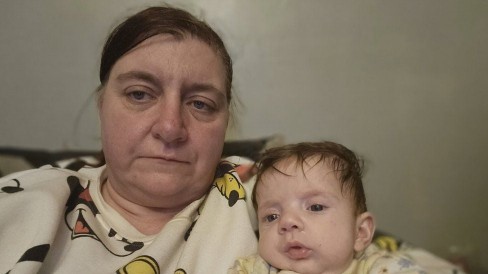Baby formula soaring costs: 'I struggle, but I won鈥檛 buy a cheaper brand'

Single mum Emma Davies is struggling with the cost of baby formula for her 13-week-old daughter Nancy.
But despite the expense, the 42-year-old says she won't buy cheaper alternatives.
"You just want the best for your children, you don't want to give them a cheaper brand," she says.Many new parents feel the same.
Amy, 25, says she and her husband have skipped meals to ensure their children are fed, clothed and warm. The mum of two spends about 拢72 a month on formula milk.
According to the Competition and Markets Authority (CMA), formula prices have risen by 25% over the past two years, generating high profit margins.
The watchdog highlighted that parents could save 拢500 in the first year of a baby's life by shopping around for alternative brands.
Although there are many available, the market is still dominated by two big players.
Danone, which owns the Aptamil and Cow & Gate brands, and Nestle, which owns SMA and Little Steps, have an 85% market share.
Emma feels like breastfeeding is not an option for her, after she contracted mastitis while breastfeeding her first child.
When it comes to her weekly grocery shop, she says she will buy the cheapest possible own-brand products available and will often look for deals and damaged products that are discounted.
"I've always been a single parent, so you budget," she says.
But for baby formula, she won't change from a more expensive brand.
"It's a risk. I'd rather stick to what I've been told, obviously, by my parents, and what I've used with my older children. It's what's been reliable."
Some parents worry that cheaper brands are less nutritional than the more expensive ones. But Amy Brown, a professor in maternal and infant health at Swansea University, says that is not the case.
"All infant formulas are tightly regulated to make sure they include the same carb, fat and protein levels and there is no evidence to say that one formula milk is better than the other."
She believes that parents may be reluctant to buy cheaper brands due to the idea that if a brand is more expensive, it must be better quality.
"Parents want the best for their baby and so they will get the more expensive product. However, parents need to understand that the price does not reflect the quality," she says.
Image source, Paul Edwards
Part of the issue might be down to the law as well.
In the UK, it is illegal to advertise infant formula - for babies up to six months - because it might discourage breastfeeding.
Additionally, retailers cannot communicate special offers via any platform for infant formula, although they can with follow-on formula - for babies older than six months.
Many, including supermarket chain Iceland, want those rules to change.
The frozen food chain's boss Richard Walker has called them "archaic and outdated" and said it prevents Iceland from being able to accept loyalty cards, cash equivalents and High Street vouchers.
"You can't even donate to food banks with infant stage formula," he said.
Another factor may be that, although the CMA says savings can be made by shopping around, when it comes to baby formula, there aren't that many own-brand products available, which are typically much cheaper than branded products.
Currently, Aldi is the only supermarket that offers formula through its own brand Mamia. Campaigners have called for more retailers to do so to help ease the financial pressures on parents.
Whatever the reason, experts agree that this is a huge issue.
Sophie Livingstone, the chief executive of charity Little Village HQ, says she hears about "terrible choices" parents and carers are having to make every day.
"Watering down formula to make it stretch further, nappy rationing and kids wearing shoes that are too small for them," she says.
The charity supports families with children under the age of five living in poverty across London.
Ms Livingstone says increases in bills, rents, food and the price of formula has created a perfect storm.
"The huge increase in demand for our help is a clear indicator of the increased pressure families are under. By August of this year, we'd helped 50% more families than the same time last year," she adds.
The CMA has said it is launching an investigation into the baby formula market, with an update expected around mid-2024.
